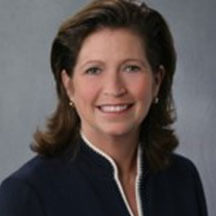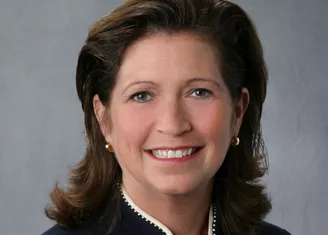The Good Capital Project will convene for the first time this June in New York City. This new SOCAP initiative will bring together a cross-sector collection of experts, practitioners, industry leaders and other stakeholders to drive greater collaboration and accelerate capital flows into purpose driven investments. In the months leading up that event we will be interviewing key pioneers and leaders in the impact space who have partnered with SOCAP to help make the Good Capital Project a success.

Gloria Nelund is Co-founder, Chairman, and CEO of TriLinc Global and a pioneer in the development of social impact products. She previously served as CEO of the U.S. Private Wealth Management Division at Deutsche Bank. Nelund was instrumental in making Deutsche Bank a leading institutional supporter of microcredit, creating multiple programs to help Private Wealth Management clients learn about and invest in the sector. Gloria also served on the Board of the Deutsche Bank Americas Community Development Group, with responsibility for providing loans, investments and grants to targeted organizations throughout the U.S. and Latin America.
SOCAP: What led you to become involved in the Good Capital Project and what are you most excited about?
Gloria Nelund: I would say that the primary reason is that at the company I founded and run, Trilinc Global, we are committed to the impact investing space. It is going to take a lot of people playing a lot of different roles in different arenas in order to completely transform how people think about investing.
We play a very specific role right now. Obviously what we do is not the only thing that needs to be done. We are always looking for opportunities to collaborate and help the industry grow. Eventually the goal is to have sustainable and impact investing to be the way everybody invests. We realize there’s a lot of work to be done and we want to be helpful in doing that work in a collaborative way.
Do you believe that collaboration is important in this industry and if so, why?
GN: I think it’s critical. Any movement that has ever been successful in changing behavior over time has been collaborative instead of competitive. We need people from every single background, way of thinking, business model. You need them all. The only way we’re going to get there is to collaborate because there’s too much to be done.
I had a conversation with somebody recently who said, “You spent your whole career on Wall Street. Did you ever find that space to be collaborative?” I started laughing and I said, “Oh my, no.” Now that’s not to say that there weren’t people who were collaborative, but as a group I would say no, absolutely not. I was disappointed when I got really involved in the impact investing space and found that it wasn’t either. We have to become collaborative.
As a firm, collaboration is one of our founding principles. We share information. I go speak at conferences, I offer classes. We do all these things to contribute data to all the databases. We are completely transparent about all of our processes because, look, it takes all of us. We’re not trying to do it all, we’re trying to do one thing, right? We’re trying to do it really well. We need everybody else doing the same thing and collaborating where we can.
Collaborating does not need to mean anybody loses. I’m one of those people who believes in the great idea that you can have everything in life you want if you just help enough other people get what they want. That to me is what collaboration is all about. I don’t have to lose anything because I help people.
What do you see as the three biggest challenges facing the space?
GN: First, I would say growing beyond the self-defined impact investment crowd. If you approach people with impact investment product and you pitch it as impact because they should do it, but they don’t know anything about it and they’re not a self-defined impact investor then you turn them off. We have first-hand experience with this.
We ended up basically saying, look, we’ve got this awesome investment product. We sell them on the investment product first and then say, “By the way, it’s got this great bonus–we only invest in sustainable companies to create positive impact in their communities. People then respond “wow, that’s the coolest thing I’ve ever heard of!”
To me, the image and branding needs work to expand the pie. We need to get non-impact investors involved in impact investing and some of that is the approach that we take. I see that as a huge hurdle, expanding the pie.
I would say the second thing is this issue of collaboration and you know truly getting people to collaborate and help each other, as opposed to just talk about it. Sharing information.
Then I would say the third challenge, which is getting better but still needs work, is the common language issue. We all need to have the same definitions, so we can all have the same pitch deck. If any of us are giving a talk on the subject of what is impact investing? We need to all have the same slides. That’s a big contributing factor to getting on the same page and getting everybody else on the same page with you.
What do you think are the three biggest opportunities?
GN: First is that we’re at the right point at the right time to take advantage of this growing trend. This is a really good time to take this to the next level because there is enough good noise about impact investing and big players talking about it. This is the time to strike, if you will.
The second thing is, like most people, I really believe that millennials are going to change the way investing happens over time. It will be decades before millennials have control of all of the money they are set to inherit. I think we have to be doing all of this now to prepare for when they do. We can’t wait to start thinking about it then. We need to do it now. I do think that they are the ones who are going to move it over the finish line so that this becomes the way investing is, but we are the ones that have the experience and the know how necessary to get it ready for them to take it over the finish line.
The third opportunity is that the population has more than doubled in the last 50 years and it’s an upward trend. We have moved a lot of people up in socio-economic status. There are not as many people now in pure abject poverty, though we still have a lot of work to do on poverty. There are more people coming into the middle class and I think that creates opportunity for sustainable companies that have new creative ideas about how not to use all of our natural resources and still be profitable because we’ve got all these consumers. This growing middle class creates opportunities for investors and businesses.
What would you most like to see come out of the Good Capital Project?
GN: I would say some real action items that industry leaders or everybody is in agreement on. Like, the UN’s Millennium Development Goals. They get all these countries together and they agree on the priorities and then they agree on the actions. They sign up for how they will contribute. That’s what I would love to see come out of it.
Do you believe that now is a critical time to start something like this project, and if so, why?
GN: I do, and I think it’s because the industry is at that tipping point where there’s so much interest in it, there’s so much momentum, that it needs a focus like this to take it to the next level.
Is there anything that you are working on that you are particularly proud of or excited about?
GN: Yes. I told you we have a specific mission of attracting non-impact investors to the space and educating people about the industry generally. For that, we launched a fund for non-accredited investors in 2013. It’s an impact fund. So that we could get the message out to as many people who don’t know anything about it as we could.
We followed a traditional Wall Street model of a fund approved by the FCC in all states. It’s a public fund, you have to go through financial advisors to have them sell it to their clients. In three and a half years, we raised over $350 million dollars from average investors. Our average ticket size was $45,000. We have 8500 investors in the fund. These are investors from every single state in the US and we have educated more than 100,000 financial advisors and their clients in that three and a half years. These are people who had never heard about impact investing.


